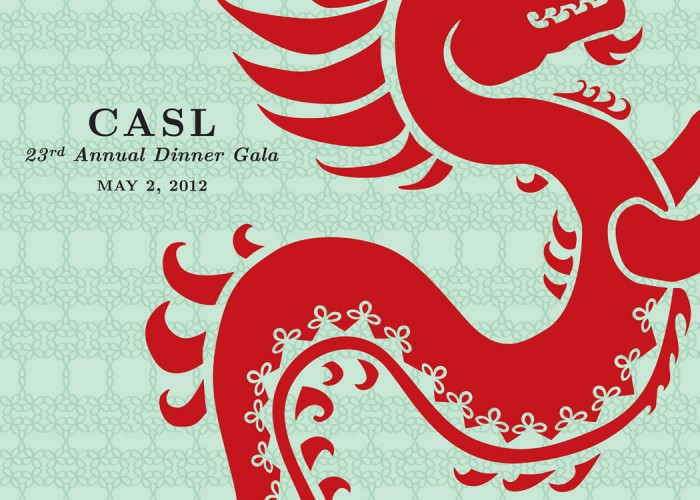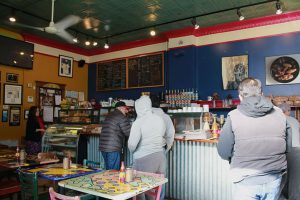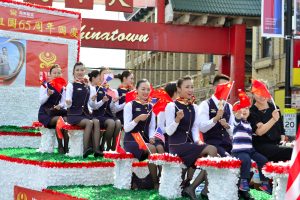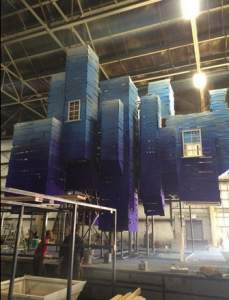The mint-green walled room is filled with Chinese-Americans sitting at folding tables, all talking at the same time. The language is constantly changing, sometimes even within the same sentence.
The Cup of Tea Discussions, hosted by the Chinese-American Service League, is a volunteer-based program that helps Chinese immigrants learn conversational English, a much needed tool to live comfortably in the city of Chicago.
A sense of community and togetherness is a common goal that is important in many groups, especially with immigrants who may feel like outcasts living in a new culture. They face a language barrier that they have to deal with every day.
This Cup of Tea meets at its Chinatown location every Saturday from 10 a.m. to 12 p.m.
Young volunteers work with the Chinese-Americans, many of them elderly, who are very eager to learn. Most of the volunteers are immigrants as well.
Each person gets a vocabulary packet with different dialogues and new words for them to learn and put to use.
The immigrants are split into groups. There is a room for Mandarin speakers, and another for Cantonese speakers. Most of the volunteers only speak Mandarin, so the Cantonese group is large compared to the six smaller sections that the Mandarin group can break into.
There are old men with newspapers who make the women laugh. It is a friendly, community atmosphere and everyone helps if someone is struggling with a word or phrase. Some of the learners lean forward in their seats attentively taking notes.
The presence of an English-speaking outsider meant that the volunteers let the curious students ask questions to practice their conversational skills.
Sentences are repeated several times because “it is very important for them to practice listening,” said Chin Fei Cheah, 28, one of the three coordinators.
Chin Fei Cheah has lived in Chicago since 2007 and has been working for Chinese American Service League (CASL) since 2009. He can speak both Mandarin and Cantonese. He said the coordinators take turns writing lesson plans and together select the main topics for the lessons.
The students have been attending these sessions for different spans of time. It was one woman’s first day, and the man sitting across from her has been going to these discussions for almost two years. This wide range of students makes it hard for the volunteers to track their progress, but if the students want to speak English badly enough, they will work hard to succeed. The volunteers are there to help the immigrants learn at whatever pace they are comfortable with.
Elin Weng, 26, has lived in Chicago for 20 years and has been a CASL volunteer for two years. She goes back to China once a year to visit her family and friends.
“Different students have different needs,” she said. “Some speak English on a daily basis and are more fluent.”
Many live far from Chinatown and have to travel a long way to make it to the Cup of Tea Discussions. “One of my students makes a four-hour commute. He feels good about coming here because he is the only Chinese person in his retirement home.” said Weng, who speaks Mandarin.
Most immigrants come to these discussion classes for this sense of belonging. They have a deep dedication to this friendly group who help them feel at home.
Fiona Ng, 25, is a volunteer who can speak both Mandarin and Cantonese. She moved here when she was 10-years-old and has been with CASL for a year and a half. “We are a very close community. After a while you get to know [the students’] backgrounds,” she said.
The volunteers learn just as much from their students as they are teaching.
“I started off volunteering because I wouldn’t be doing anything productive anyways on Saturday. But soon I discovered that these students– who are way older than I am– are putting in serious effort into learning a skill I have taken for granted.”
“By talking to them, I also learn about the sacrifices they made when they immigrated over. Many of them would prefer to have stayed at their homeland, but they never regretted making this choice for their children’s sake. In a way, I want to help compensate for what they have done for their children by helping them to communicate with their grandchildren who now mostly speak English,” said Chin Fei Cheah.
Jing Cheng belongs to such a family. “I became interested in volunteering at CASL and with Cup of Tea because I came from an immigrant family myself. While I was growing up, I had benefited from agencies, and I saw it as a way to pay it forward. As I’ve continued though, it’s become more about the students. I look forward to talking to the 68-year-old who rides two trains and a bus to get to Cup of Tea and helping the newly immigrated couple learn how to buy groceries. It’s a rewarding way to spend a Saturday morning,” Cheng said.
Overall there are about 30 volunteers in CASL who show up whatever week they can. There is no formal schedule for who can be there, and anyone who is interested can become a volunteer.
“Truth be told, not every student has made satisfactory progress, but then not every student came for that sole purpose,” said Cheah, “Some came for the company and I try to make it worthwhile too. And they are all great company to me as well.”


















Be First to Comment